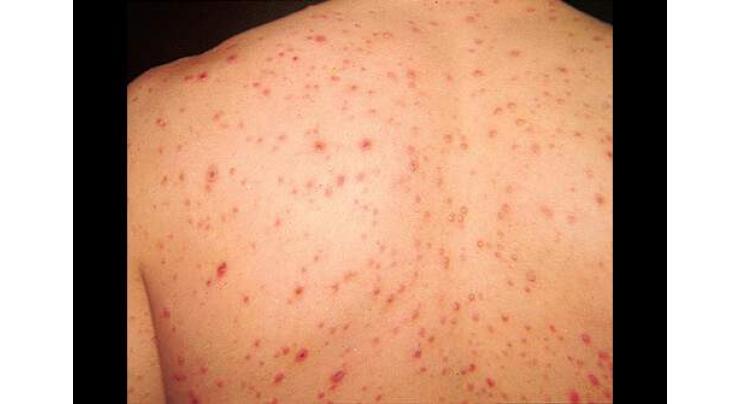
Chickenpox Disease Mainly Affects Childern Below 12 Years: Dr.Salma
Faizan Hashmi Published February 06, 2018 | 03:36 PM

Chickenpox is very common and highly contagious and the more than 90 percent of Chickenpox cases occur in children less than 12 years of age
HYDERABAD, (UrduPoint / Pakistan Point News - 06th Feb, 2018 ) :Chickenpox is very common and highly contagious and the more than 90 percent of Chickenpox cases occur in children less than 12 years of age.
Eminent Child Specialist and Pediatrician of Liaquat University of Medical and Health Sciences Jamshoro Professor Dr. Salma Shaikh expressed these views while talking to APP here on Tuesday. She said that its symptoms included high fever, headache, pain in the joints and muscles and lethargy.
She said antibiotics should be avoided unless they were absolutely necessary. �Antibiotics are needed if brain damage is indicated or if the patient is suffering pneumonia,� the doctor said.
People belonging to the lower and lower-middle classes cannot afford to buy these vaccines from the market,� she added. She informed that most people contract chickenpox by age 15, the majority between ages 5 and 9, but all ages can contract it and the chickenpox is usually more severe in adults and very young infants than children.
Winter and spring are the most common times of the year for chickenpox to occur, added. About the chickenpox spread Dr Salma informed that chickenpox is very highly contagious and it is easily passed between members of families and school classmates through airborne particles, droplets in exhaled air and fluid from the blisters or sores and it also can be transmitted indirectly by contact with articles of clothing and other items exposed to fresh drainage from open sores.
She said that patients are contagious up to five days (more commonly, one to two days) before and five days after the date that their rash appears. When the sores have crusted over, the person is usually no longer contagious.
About the symptoms of chickenpox she informed that symptoms tend to appear 14 to 16 days after the initial exposure but can occur any time from 10 days up to 21 days after contact with the virus.
She further said that chickenpox is characterized by one to two days of mild fever up to 102 degrees F, general weakness, and a rash, often the first sign of the disease.
She said that the rash of chickenpox develops in crops with raised red spots arriving first, progressing to blisters that burst, and creating open sores, before crusting over.
About the complications of this disease she said that infection of the open pox sore by bacteria can injure the skin, sometimes causing scarring, especially if the patient scratches the inflamed area and the bacterial skin infection is, in fact, and the most common complication of chickenpox in children.
Dr.Salma further informed that the complications also occur in people taking immune-suppressing drugs, such as cortisone-related medications. Newborn infants whose mothers have chickenpox in the last trimester of pregnancy are at increased risk from the disease.
If the mother develops the disease from five days before to two days after delivery, the fatality rate for the baby is up to 30 percent, Salma added. About the Chicken pox vaccination Professor Shaikh informed that the vaccination requires only two shots and the first vaccination is given at about 1 year of age, and the second is given at 4 years of age.
She said that if an older person has not had chickenpox, the shot may be given at any time. There have been few significant adverse reactions to the chickenpox vaccine. All children, except those with a compromised immune system, should have the vaccination, added.
Dr. Salma Shaikh further informed about the chicken pox that during pregnancy chickenpox can cause serious problems especially when infection occurs early in the pregnancy or at the time of delivery.
She said that if chickenpox occurs early in pregnancy, several types of fetal abnormalities, including limb abnormalities, scarring of internal organs and neurological damage can occur. About the prevention, Dr.Salma Shaikh said that chickenpox can be prevented and the easiest way to prevent catching chicken pox is to get vaccinated.
However, vaccination is only successful in 70 percent to percent of all vaccinations.
Recent Stories

Mired in crisis, Boeing reports another loss

Session Awarding Ceremony 2024 held at Cadet College Muzaffarabad

Austrian ski great Hirscher to make comeback under Dutch flag

Pakistan, Japan agrees to convene 'Economic Policy Dialogue'

FM Dar conveys deepest sympathy on torrential rains devastation in UAE

Spain PM Sanchez says weighing resignation after wife's graft probe

Tennis: ATP/WTA Madrid Open results - 1st update

Long-lost Klimt portrait auctioned off for 30 mn euros

Osaka seals first win on clay since 2022 in Madrid

Earthquake jolts Karachi

Sindh minister orders operation after attack on police in Ghotki

TikTok to fight US ban law in courts
More Stories From Health
-

Vaccines save at least 154 million lives in 50 years: WHO
6 hours ago -

UHS to issue MBBS degrees within three months after final result
9 hours ago -

Rawalpindi woman gives birth to six babies
5 days ago -

DC calls for intensive anti-polio drive in ICT
6 days ago -

World Hemophilia Day observed to underscore importance of providing comprehensive care
7 days ago -

Six in a family with heart on the 'right side'
7 days ago
-

Diabetic disease increasing rapidly : Dr. Noor Elahi Memon
7 days ago -

World Hemophilia Day observed
7 days ago -

ATC dismisses bail petition of doctor involved in illegal kidneys transplant
15 days ago -

Dr. Shehzad warns against deviation from WHO guidelines on anti-smoking
15 days ago -

Health activists express concerns over attempts to derail tobacco control
17 days ago -

UHS declares MBBS first prof, MS urology exam results
26 days ago











